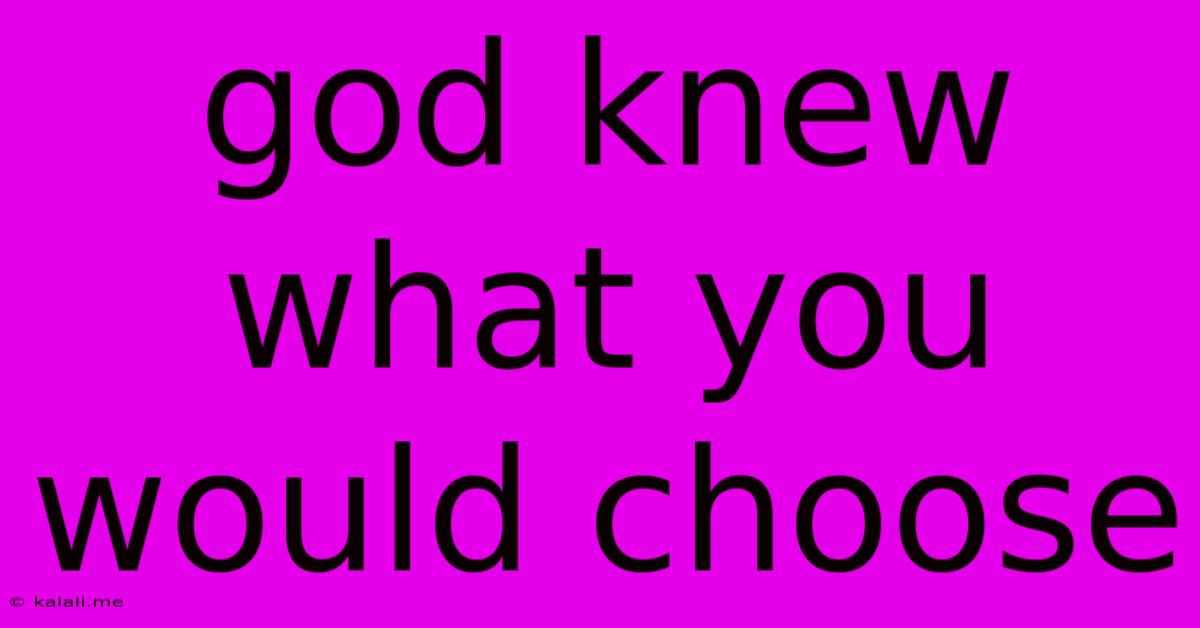God Knew What You Would Choose
Kalali
May 31, 2025 · 3 min read

Table of Contents
God Knew What You Would Choose: Exploring Predestination and Free Will
Meta Description: Explore the complex theological concept of predestination and free will. This article examines how God's omniscience aligns with human choice, delving into different perspectives and offering a thoughtful reflection on faith and agency.
The question of whether God knew what you would choose before you even made the choice is a cornerstone of theological debate, sparking centuries of discussion and philosophical inquiry. It wrestles with the seemingly paradoxical concepts of divine omniscience – God's all-knowing nature – and human free will – our capacity to make independent choices. This article will explore the intricacies of this complex theological puzzle, examining different perspectives and offering a space for thoughtful reflection.
Understanding Divine Omniscience
At the heart of this discussion lies the nature of God's knowledge. If God is truly omniscient, knowing everything that has happened, is happening, and will happen, then it seems He must know every choice we will ever make. This perspective, often associated with predestination, suggests that God has already foreseen and ordained every event, including our individual decisions. This doesn't necessarily imply that God forces us to make those choices; rather, He possesses perfect foreknowledge of our actions.
The Paradox of Free Will
This is where the apparent paradox arises. If God already knows our choices, does that negate our free will? Are we truly free to choose if God already knows the outcome? Many theologians and philosophers argue that true freedom requires the ability to choose otherwise, a concept incompatible with absolute predestination. This perspective emphasizes the agency of humanity, suggesting that God's knowledge doesn't diminish our capacity to make authentic choices that have real consequences.
Reconciling Predestination and Free Will: Different Perspectives
Different theological viewpoints offer various attempts to reconcile these seemingly conflicting ideas:
-
Compatibilism: This approach argues that free will and divine foreknowledge are compatible. God's knowledge doesn't necessitate determinism; our choices are still free, even if God knows what those choices will be. The analogy often used is that of an author knowing the ending of a story even though the characters make their own choices that lead to that conclusion.
-
Open Theism: This perspective suggests that God's knowledge is not exhaustive in the sense that He doesn't know the future with complete certainty. Instead, God works within a framework of possibilities, responding to human choices as they unfold. This approach prioritizes human freedom and limits God's foreknowledge to a certain degree.
-
Classical Theism: This view affirms both God's omniscience and human free will, but doesn't offer a clear explanation of how these seemingly contradictory concepts coexist. It accepts the mystery of this paradox as an aspect of God's infinite nature, beyond human comprehension.
The Implications for Faith and Life
Regardless of the theological perspective one adopts, the question of God's knowledge and our choices has significant implications for our faith and how we live our lives:
- Responsibility: Whether or not God knew our choices beforehand, we are still responsible for our actions and their consequences. This emphasizes the importance of making ethical choices and living a life aligned with our values.
- Grace and Mercy: Understanding that God's knowledge encompasses our failures and shortcomings can deepen our appreciation for His grace and mercy. His love extends even to our flawed decisions.
- Trust and Surrender: Acknowledging God's omniscience can foster a deeper trust in His plan, even amidst uncertainty and suffering. It encourages surrender to His will, knowing that even our struggles have a place in His greater purpose.
Ultimately, the question of whether God knew what you would choose is a deeply personal and complex one. There is no single definitive answer that satisfies everyone. However, grappling with this question can lead to a richer understanding of faith, free will, and the nature of God himself. The journey of exploring this mystery is perhaps as significant as finding a conclusive answer.
Latest Posts
Latest Posts
-
Eaton Breaker Blinking Red 5 Times
Jun 02, 2025
-
How To Get Oil Out Of Carpet
Jun 02, 2025
-
How To Get Rid Of Styrofoam
Jun 02, 2025
-
Can I Split Non Spliter Air Condtitoner
Jun 02, 2025
-
O You Read Each Reading Frame Protein Modeling
Jun 02, 2025
Related Post
Thank you for visiting our website which covers about God Knew What You Would Choose . We hope the information provided has been useful to you. Feel free to contact us if you have any questions or need further assistance. See you next time and don't miss to bookmark.